An Analysis of Marxism and Its Continued Relevance in the Modern World
VerifiedAdded on 2021/06/14
|9
|2793
|167
Essay
AI Summary
This essay provides an overview of Marxism, starting with Karl Marx's core ideas from "The Communist Manifesto" and exploring its evolution. It defines Marxism as a socioeconomic analysis that critiques capitalism, analyzes class relations, and views social transformation through a materialist interpretation of history. The essay discusses key concepts such as class conflict, the bourgeoisie, the proletariat, and the theory of the state, contrasting Marx's views with those of John Locke and Hegel. It examines the concepts of private property, accumulation of wealth, and the nature of labor and capital within a Marxist framework. The essay concludes by assessing the relevance of Marxism in the context of modern challenges like unemployment and technological advancements, suggesting that some aspects of Marxist theory may seem outdated in the current environment.
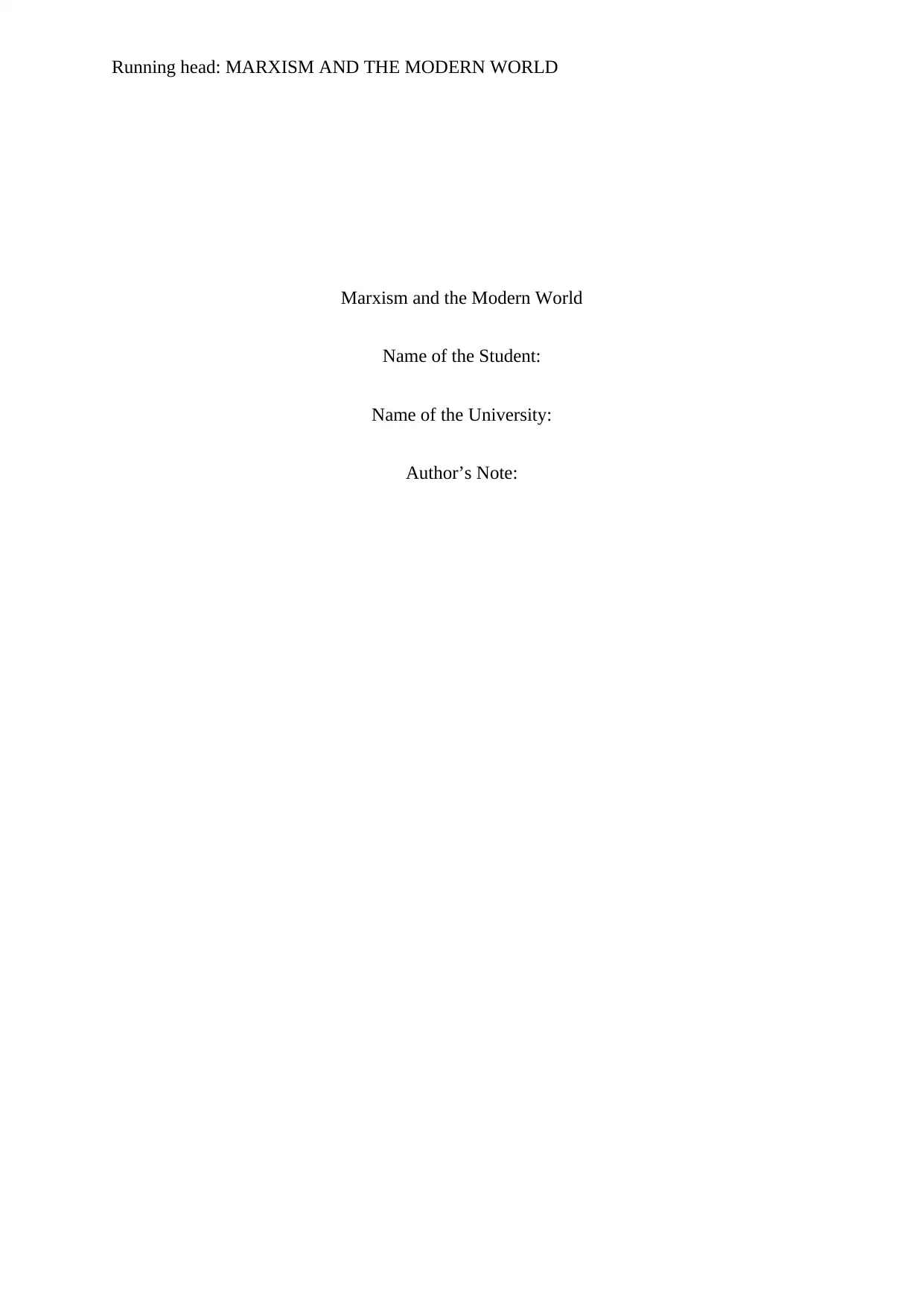
Running head: MARXISM AND THE MODERN WORLD
Marxism and the Modern World
Name of the Student:
Name of the University:
Author’s Note:
Marxism and the Modern World
Name of the Student:
Name of the University:
Author’s Note:
Paraphrase This Document
Need a fresh take? Get an instant paraphrase of this document with our AI Paraphraser
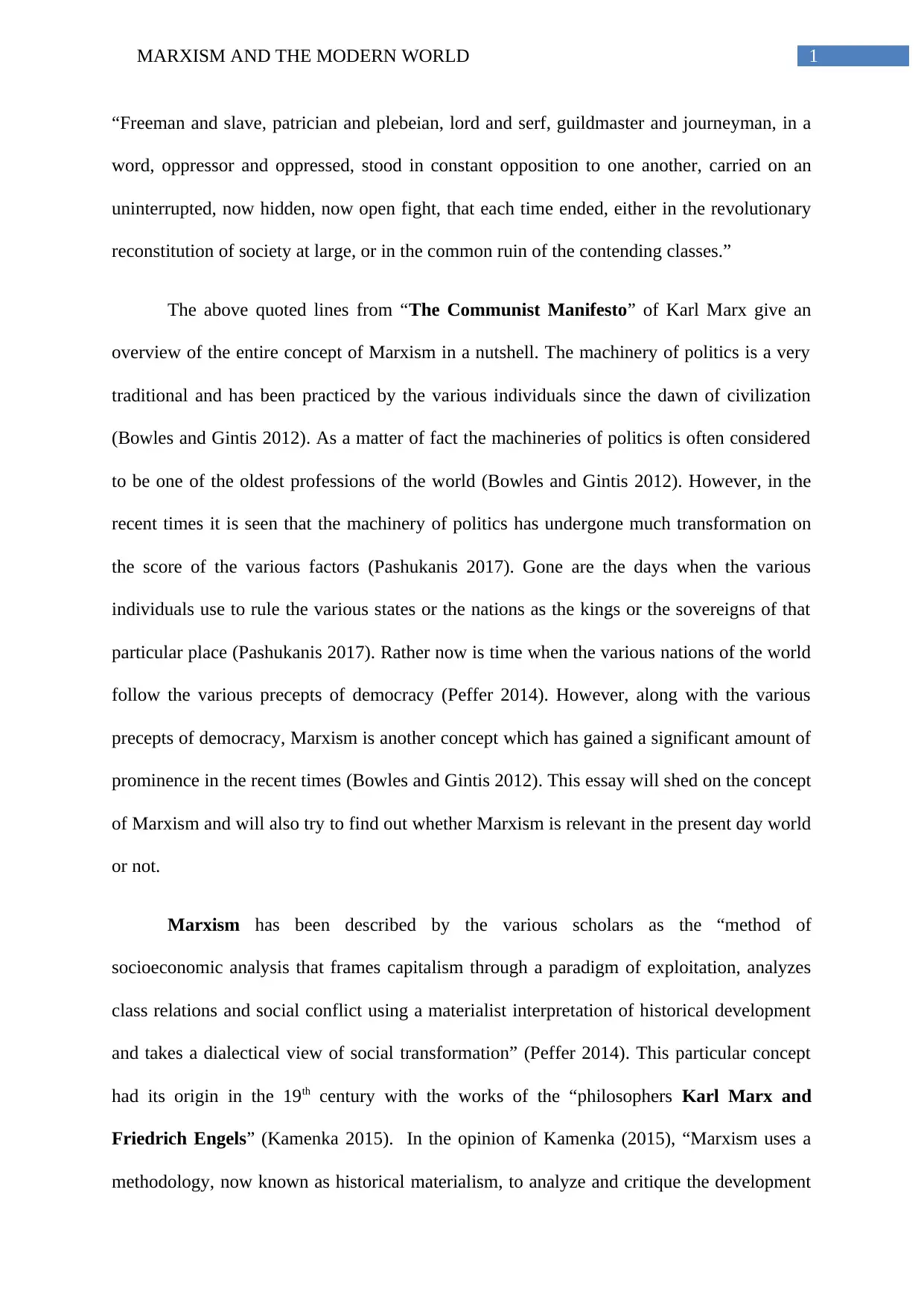
1MARXISM AND THE MODERN WORLD
“Freeman and slave, patrician and plebeian, lord and serf, guildmaster and journeyman, in a
word, oppressor and oppressed, stood in constant opposition to one another, carried on an
uninterrupted, now hidden, now open fight, that each time ended, either in the revolutionary
reconstitution of society at large, or in the common ruin of the contending classes.”
The above quoted lines from “The Communist Manifesto” of Karl Marx give an
overview of the entire concept of Marxism in a nutshell. The machinery of politics is a very
traditional and has been practiced by the various individuals since the dawn of civilization
(Bowles and Gintis 2012). As a matter of fact the machineries of politics is often considered
to be one of the oldest professions of the world (Bowles and Gintis 2012). However, in the
recent times it is seen that the machinery of politics has undergone much transformation on
the score of the various factors (Pashukanis 2017). Gone are the days when the various
individuals use to rule the various states or the nations as the kings or the sovereigns of that
particular place (Pashukanis 2017). Rather now is time when the various nations of the world
follow the various precepts of democracy (Peffer 2014). However, along with the various
precepts of democracy, Marxism is another concept which has gained a significant amount of
prominence in the recent times (Bowles and Gintis 2012). This essay will shed on the concept
of Marxism and will also try to find out whether Marxism is relevant in the present day world
or not.
Marxism has been described by the various scholars as the “method of
socioeconomic analysis that frames capitalism through a paradigm of exploitation, analyzes
class relations and social conflict using a materialist interpretation of historical development
and takes a dialectical view of social transformation” (Peffer 2014). This particular concept
had its origin in the 19th century with the works of the “philosophers Karl Marx and
Friedrich Engels” (Kamenka 2015). In the opinion of Kamenka (2015), “Marxism uses a
methodology, now known as historical materialism, to analyze and critique the development
“Freeman and slave, patrician and plebeian, lord and serf, guildmaster and journeyman, in a
word, oppressor and oppressed, stood in constant opposition to one another, carried on an
uninterrupted, now hidden, now open fight, that each time ended, either in the revolutionary
reconstitution of society at large, or in the common ruin of the contending classes.”
The above quoted lines from “The Communist Manifesto” of Karl Marx give an
overview of the entire concept of Marxism in a nutshell. The machinery of politics is a very
traditional and has been practiced by the various individuals since the dawn of civilization
(Bowles and Gintis 2012). As a matter of fact the machineries of politics is often considered
to be one of the oldest professions of the world (Bowles and Gintis 2012). However, in the
recent times it is seen that the machinery of politics has undergone much transformation on
the score of the various factors (Pashukanis 2017). Gone are the days when the various
individuals use to rule the various states or the nations as the kings or the sovereigns of that
particular place (Pashukanis 2017). Rather now is time when the various nations of the world
follow the various precepts of democracy (Peffer 2014). However, along with the various
precepts of democracy, Marxism is another concept which has gained a significant amount of
prominence in the recent times (Bowles and Gintis 2012). This essay will shed on the concept
of Marxism and will also try to find out whether Marxism is relevant in the present day world
or not.
Marxism has been described by the various scholars as the “method of
socioeconomic analysis that frames capitalism through a paradigm of exploitation, analyzes
class relations and social conflict using a materialist interpretation of historical development
and takes a dialectical view of social transformation” (Peffer 2014). This particular concept
had its origin in the 19th century with the works of the “philosophers Karl Marx and
Friedrich Engels” (Kamenka 2015). In the opinion of Kamenka (2015), “Marxism uses a
methodology, now known as historical materialism, to analyze and critique the development
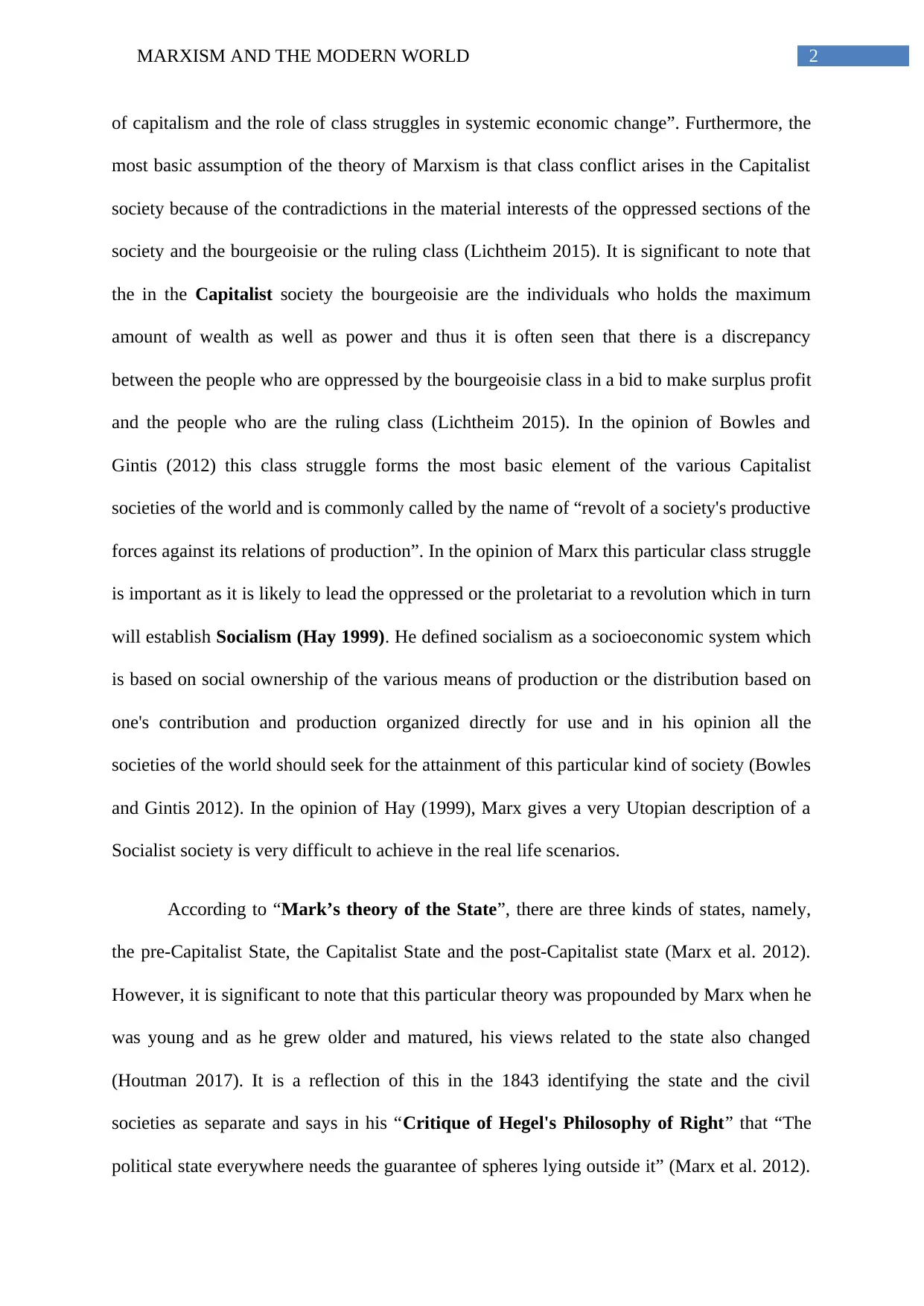
2MARXISM AND THE MODERN WORLD
of capitalism and the role of class struggles in systemic economic change”. Furthermore, the
most basic assumption of the theory of Marxism is that class conflict arises in the Capitalist
society because of the contradictions in the material interests of the oppressed sections of the
society and the bourgeoisie or the ruling class (Lichtheim 2015). It is significant to note that
the in the Capitalist society the bourgeoisie are the individuals who holds the maximum
amount of wealth as well as power and thus it is often seen that there is a discrepancy
between the people who are oppressed by the bourgeoisie class in a bid to make surplus profit
and the people who are the ruling class (Lichtheim 2015). In the opinion of Bowles and
Gintis (2012) this class struggle forms the most basic element of the various Capitalist
societies of the world and is commonly called by the name of “revolt of a society's productive
forces against its relations of production”. In the opinion of Marx this particular class struggle
is important as it is likely to lead the oppressed or the proletariat to a revolution which in turn
will establish Socialism (Hay 1999). He defined socialism as a socioeconomic system which
is based on social ownership of the various means of production or the distribution based on
one's contribution and production organized directly for use and in his opinion all the
societies of the world should seek for the attainment of this particular kind of society (Bowles
and Gintis 2012). In the opinion of Hay (1999), Marx gives a very Utopian description of a
Socialist society is very difficult to achieve in the real life scenarios.
According to “Mark’s theory of the State”, there are three kinds of states, namely,
the pre-Capitalist State, the Capitalist State and the post-Capitalist state (Marx et al. 2012).
However, it is significant to note that this particular theory was propounded by Marx when he
was young and as he grew older and matured, his views related to the state also changed
(Houtman 2017). It is a reflection of this in the 1843 identifying the state and the civil
societies as separate and says in his “Critique of Hegel's Philosophy of Right” that “The
political state everywhere needs the guarantee of spheres lying outside it” (Marx et al. 2012).
of capitalism and the role of class struggles in systemic economic change”. Furthermore, the
most basic assumption of the theory of Marxism is that class conflict arises in the Capitalist
society because of the contradictions in the material interests of the oppressed sections of the
society and the bourgeoisie or the ruling class (Lichtheim 2015). It is significant to note that
the in the Capitalist society the bourgeoisie are the individuals who holds the maximum
amount of wealth as well as power and thus it is often seen that there is a discrepancy
between the people who are oppressed by the bourgeoisie class in a bid to make surplus profit
and the people who are the ruling class (Lichtheim 2015). In the opinion of Bowles and
Gintis (2012) this class struggle forms the most basic element of the various Capitalist
societies of the world and is commonly called by the name of “revolt of a society's productive
forces against its relations of production”. In the opinion of Marx this particular class struggle
is important as it is likely to lead the oppressed or the proletariat to a revolution which in turn
will establish Socialism (Hay 1999). He defined socialism as a socioeconomic system which
is based on social ownership of the various means of production or the distribution based on
one's contribution and production organized directly for use and in his opinion all the
societies of the world should seek for the attainment of this particular kind of society (Bowles
and Gintis 2012). In the opinion of Hay (1999), Marx gives a very Utopian description of a
Socialist society is very difficult to achieve in the real life scenarios.
According to “Mark’s theory of the State”, there are three kinds of states, namely,
the pre-Capitalist State, the Capitalist State and the post-Capitalist state (Marx et al. 2012).
However, it is significant to note that this particular theory was propounded by Marx when he
was young and as he grew older and matured, his views related to the state also changed
(Houtman 2017). It is a reflection of this in the 1843 identifying the state and the civil
societies as separate and says in his “Critique of Hegel's Philosophy of Right” that “The
political state everywhere needs the guarantee of spheres lying outside it” (Marx et al. 2012).
⊘ This is a preview!⊘
Do you want full access?
Subscribe today to unlock all pages.

Trusted by 1+ million students worldwide
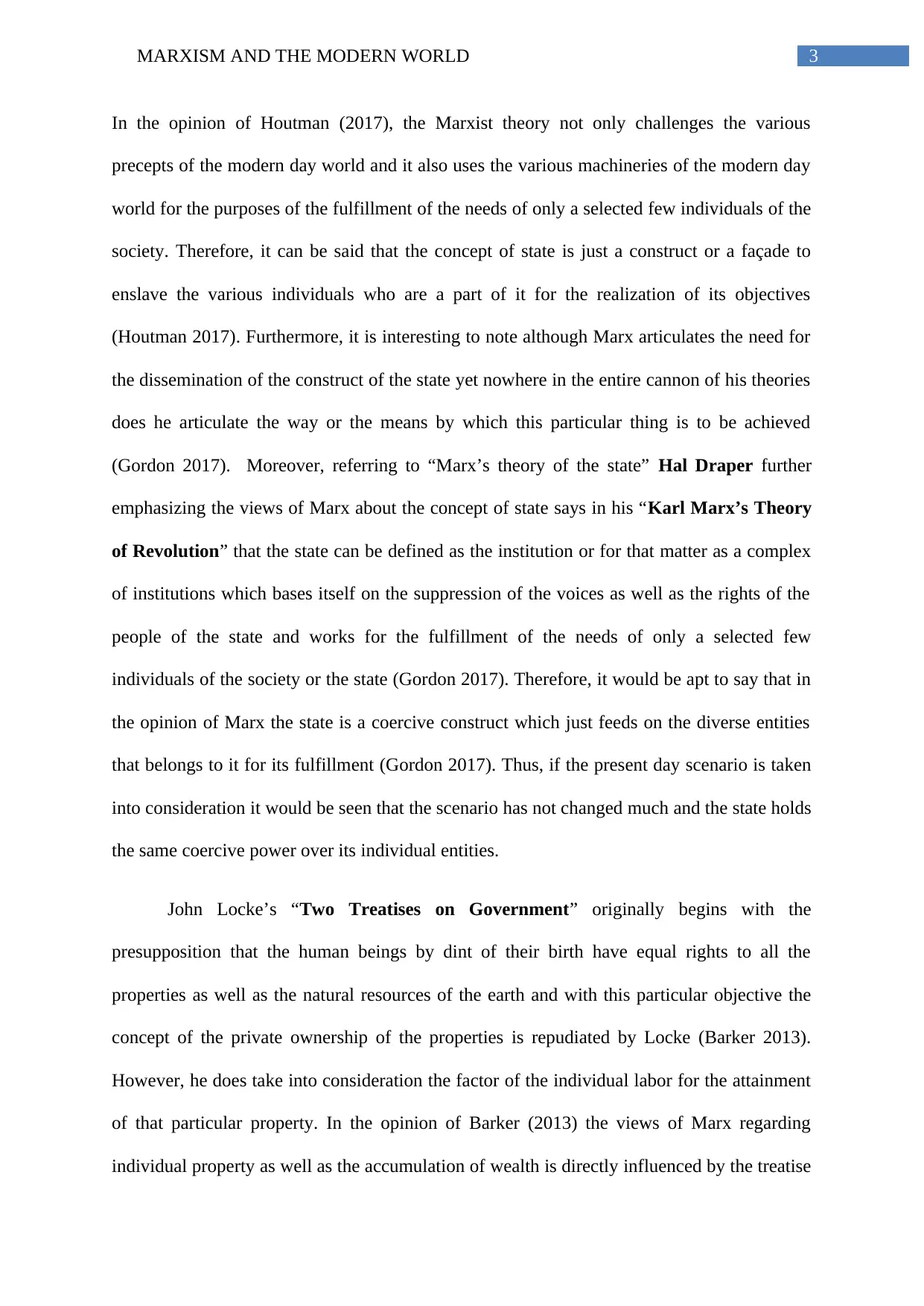
3MARXISM AND THE MODERN WORLD
In the opinion of Houtman (2017), the Marxist theory not only challenges the various
precepts of the modern day world and it also uses the various machineries of the modern day
world for the purposes of the fulfillment of the needs of only a selected few individuals of the
society. Therefore, it can be said that the concept of state is just a construct or a façade to
enslave the various individuals who are a part of it for the realization of its objectives
(Houtman 2017). Furthermore, it is interesting to note although Marx articulates the need for
the dissemination of the construct of the state yet nowhere in the entire cannon of his theories
does he articulate the way or the means by which this particular thing is to be achieved
(Gordon 2017). Moreover, referring to “Marx’s theory of the state” Hal Draper further
emphasizing the views of Marx about the concept of state says in his “Karl Marx’s Theory
of Revolution” that the state can be defined as the institution or for that matter as a complex
of institutions which bases itself on the suppression of the voices as well as the rights of the
people of the state and works for the fulfillment of the needs of only a selected few
individuals of the society or the state (Gordon 2017). Therefore, it would be apt to say that in
the opinion of Marx the state is a coercive construct which just feeds on the diverse entities
that belongs to it for its fulfillment (Gordon 2017). Thus, if the present day scenario is taken
into consideration it would be seen that the scenario has not changed much and the state holds
the same coercive power over its individual entities.
John Locke’s “Two Treatises on Government” originally begins with the
presupposition that the human beings by dint of their birth have equal rights to all the
properties as well as the natural resources of the earth and with this particular objective the
concept of the private ownership of the properties is repudiated by Locke (Barker 2013).
However, he does take into consideration the factor of the individual labor for the attainment
of that particular property. In the opinion of Barker (2013) the views of Marx regarding
individual property as well as the accumulation of wealth is directly influenced by the treatise
In the opinion of Houtman (2017), the Marxist theory not only challenges the various
precepts of the modern day world and it also uses the various machineries of the modern day
world for the purposes of the fulfillment of the needs of only a selected few individuals of the
society. Therefore, it can be said that the concept of state is just a construct or a façade to
enslave the various individuals who are a part of it for the realization of its objectives
(Houtman 2017). Furthermore, it is interesting to note although Marx articulates the need for
the dissemination of the construct of the state yet nowhere in the entire cannon of his theories
does he articulate the way or the means by which this particular thing is to be achieved
(Gordon 2017). Moreover, referring to “Marx’s theory of the state” Hal Draper further
emphasizing the views of Marx about the concept of state says in his “Karl Marx’s Theory
of Revolution” that the state can be defined as the institution or for that matter as a complex
of institutions which bases itself on the suppression of the voices as well as the rights of the
people of the state and works for the fulfillment of the needs of only a selected few
individuals of the society or the state (Gordon 2017). Therefore, it would be apt to say that in
the opinion of Marx the state is a coercive construct which just feeds on the diverse entities
that belongs to it for its fulfillment (Gordon 2017). Thus, if the present day scenario is taken
into consideration it would be seen that the scenario has not changed much and the state holds
the same coercive power over its individual entities.
John Locke’s “Two Treatises on Government” originally begins with the
presupposition that the human beings by dint of their birth have equal rights to all the
properties as well as the natural resources of the earth and with this particular objective the
concept of the private ownership of the properties is repudiated by Locke (Barker 2013).
However, he does take into consideration the factor of the individual labor for the attainment
of that particular property. In the opinion of Barker (2013) the views of Marx regarding
individual property as well as the accumulation of wealth is directly influenced by the treatise
Paraphrase This Document
Need a fresh take? Get an instant paraphrase of this document with our AI Paraphraser
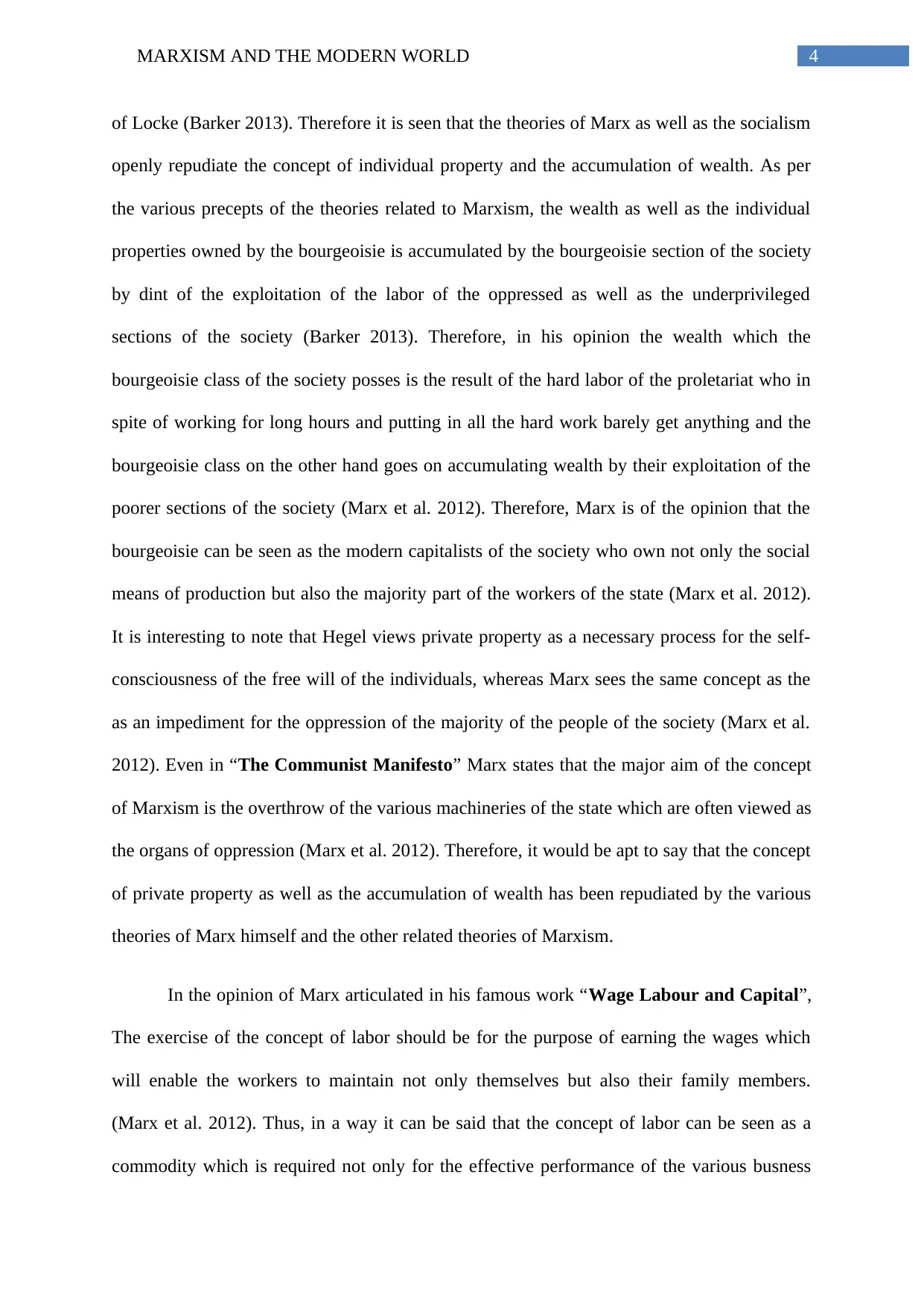
4MARXISM AND THE MODERN WORLD
of Locke (Barker 2013). Therefore it is seen that the theories of Marx as well as the socialism
openly repudiate the concept of individual property and the accumulation of wealth. As per
the various precepts of the theories related to Marxism, the wealth as well as the individual
properties owned by the bourgeoisie is accumulated by the bourgeoisie section of the society
by dint of the exploitation of the labor of the oppressed as well as the underprivileged
sections of the society (Barker 2013). Therefore, in his opinion the wealth which the
bourgeoisie class of the society posses is the result of the hard labor of the proletariat who in
spite of working for long hours and putting in all the hard work barely get anything and the
bourgeoisie class on the other hand goes on accumulating wealth by their exploitation of the
poorer sections of the society (Marx et al. 2012). Therefore, Marx is of the opinion that the
bourgeoisie can be seen as the modern capitalists of the society who own not only the social
means of production but also the majority part of the workers of the state (Marx et al. 2012).
It is interesting to note that Hegel views private property as a necessary process for the self-
consciousness of the free will of the individuals, whereas Marx sees the same concept as the
as an impediment for the oppression of the majority of the people of the society (Marx et al.
2012). Even in “The Communist Manifesto” Marx states that the major aim of the concept
of Marxism is the overthrow of the various machineries of the state which are often viewed as
the organs of oppression (Marx et al. 2012). Therefore, it would be apt to say that the concept
of private property as well as the accumulation of wealth has been repudiated by the various
theories of Marx himself and the other related theories of Marxism.
In the opinion of Marx articulated in his famous work “Wage Labour and Capital”,
The exercise of the concept of labor should be for the purpose of earning the wages which
will enable the workers to maintain not only themselves but also their family members.
(Marx et al. 2012). Thus, in a way it can be said that the concept of labor can be seen as a
commodity which is required not only for the effective performance of the various busness
of Locke (Barker 2013). Therefore it is seen that the theories of Marx as well as the socialism
openly repudiate the concept of individual property and the accumulation of wealth. As per
the various precepts of the theories related to Marxism, the wealth as well as the individual
properties owned by the bourgeoisie is accumulated by the bourgeoisie section of the society
by dint of the exploitation of the labor of the oppressed as well as the underprivileged
sections of the society (Barker 2013). Therefore, in his opinion the wealth which the
bourgeoisie class of the society posses is the result of the hard labor of the proletariat who in
spite of working for long hours and putting in all the hard work barely get anything and the
bourgeoisie class on the other hand goes on accumulating wealth by their exploitation of the
poorer sections of the society (Marx et al. 2012). Therefore, Marx is of the opinion that the
bourgeoisie can be seen as the modern capitalists of the society who own not only the social
means of production but also the majority part of the workers of the state (Marx et al. 2012).
It is interesting to note that Hegel views private property as a necessary process for the self-
consciousness of the free will of the individuals, whereas Marx sees the same concept as the
as an impediment for the oppression of the majority of the people of the society (Marx et al.
2012). Even in “The Communist Manifesto” Marx states that the major aim of the concept
of Marxism is the overthrow of the various machineries of the state which are often viewed as
the organs of oppression (Marx et al. 2012). Therefore, it would be apt to say that the concept
of private property as well as the accumulation of wealth has been repudiated by the various
theories of Marx himself and the other related theories of Marxism.
In the opinion of Marx articulated in his famous work “Wage Labour and Capital”,
The exercise of the concept of labor should be for the purpose of earning the wages which
will enable the workers to maintain not only themselves but also their family members.
(Marx et al. 2012). Thus, in a way it can be said that the concept of labor can be seen as a
commodity which is required not only for the effective performance of the various busness
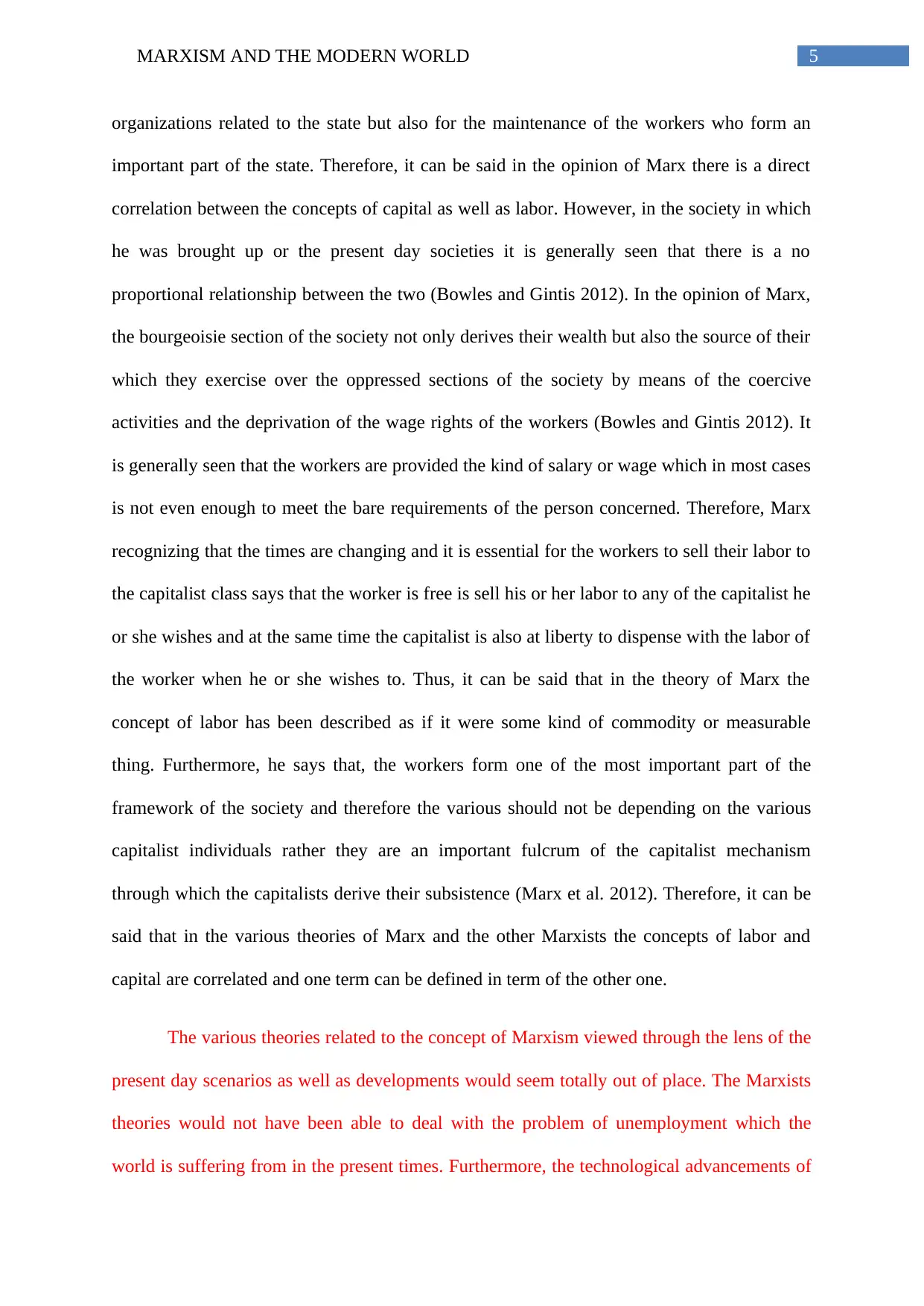
5MARXISM AND THE MODERN WORLD
organizations related to the state but also for the maintenance of the workers who form an
important part of the state. Therefore, it can be said in the opinion of Marx there is a direct
correlation between the concepts of capital as well as labor. However, in the society in which
he was brought up or the present day societies it is generally seen that there is a no
proportional relationship between the two (Bowles and Gintis 2012). In the opinion of Marx,
the bourgeoisie section of the society not only derives their wealth but also the source of their
which they exercise over the oppressed sections of the society by means of the coercive
activities and the deprivation of the wage rights of the workers (Bowles and Gintis 2012). It
is generally seen that the workers are provided the kind of salary or wage which in most cases
is not even enough to meet the bare requirements of the person concerned. Therefore, Marx
recognizing that the times are changing and it is essential for the workers to sell their labor to
the capitalist class says that the worker is free is sell his or her labor to any of the capitalist he
or she wishes and at the same time the capitalist is also at liberty to dispense with the labor of
the worker when he or she wishes to. Thus, it can be said that in the theory of Marx the
concept of labor has been described as if it were some kind of commodity or measurable
thing. Furthermore, he says that, the workers form one of the most important part of the
framework of the society and therefore the various should not be depending on the various
capitalist individuals rather they are an important fulcrum of the capitalist mechanism
through which the capitalists derive their subsistence (Marx et al. 2012). Therefore, it can be
said that in the various theories of Marx and the other Marxists the concepts of labor and
capital are correlated and one term can be defined in term of the other one.
The various theories related to the concept of Marxism viewed through the lens of the
present day scenarios as well as developments would seem totally out of place. The Marxists
theories would not have been able to deal with the problem of unemployment which the
world is suffering from in the present times. Furthermore, the technological advancements of
organizations related to the state but also for the maintenance of the workers who form an
important part of the state. Therefore, it can be said in the opinion of Marx there is a direct
correlation between the concepts of capital as well as labor. However, in the society in which
he was brought up or the present day societies it is generally seen that there is a no
proportional relationship between the two (Bowles and Gintis 2012). In the opinion of Marx,
the bourgeoisie section of the society not only derives their wealth but also the source of their
which they exercise over the oppressed sections of the society by means of the coercive
activities and the deprivation of the wage rights of the workers (Bowles and Gintis 2012). It
is generally seen that the workers are provided the kind of salary or wage which in most cases
is not even enough to meet the bare requirements of the person concerned. Therefore, Marx
recognizing that the times are changing and it is essential for the workers to sell their labor to
the capitalist class says that the worker is free is sell his or her labor to any of the capitalist he
or she wishes and at the same time the capitalist is also at liberty to dispense with the labor of
the worker when he or she wishes to. Thus, it can be said that in the theory of Marx the
concept of labor has been described as if it were some kind of commodity or measurable
thing. Furthermore, he says that, the workers form one of the most important part of the
framework of the society and therefore the various should not be depending on the various
capitalist individuals rather they are an important fulcrum of the capitalist mechanism
through which the capitalists derive their subsistence (Marx et al. 2012). Therefore, it can be
said that in the various theories of Marx and the other Marxists the concepts of labor and
capital are correlated and one term can be defined in term of the other one.
The various theories related to the concept of Marxism viewed through the lens of the
present day scenarios as well as developments would seem totally out of place. The Marxists
theories would not have been able to deal with the problem of unemployment which the
world is suffering from in the present times. Furthermore, the technological advancements of
⊘ This is a preview!⊘
Do you want full access?
Subscribe today to unlock all pages.

Trusted by 1+ million students worldwide
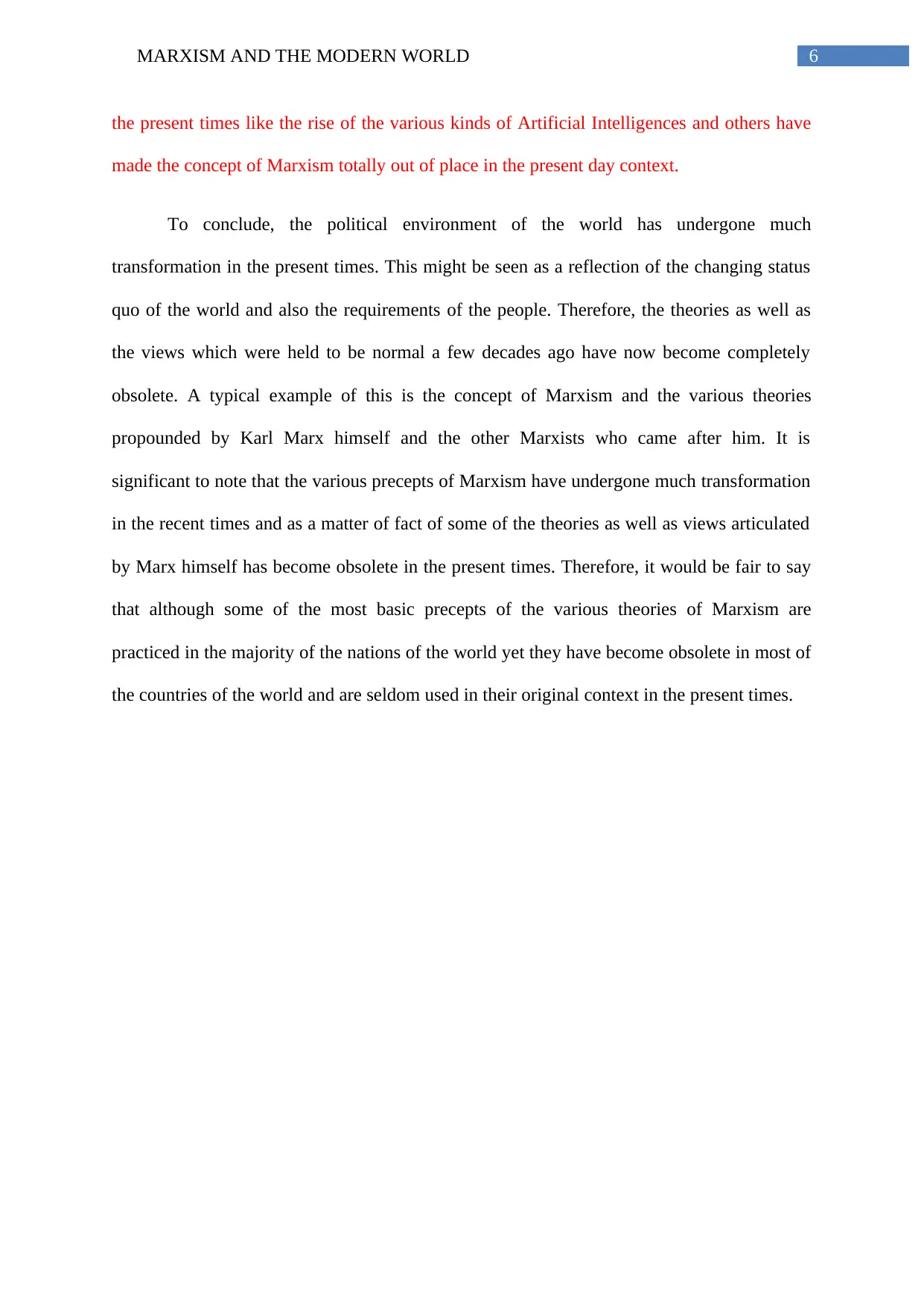
6MARXISM AND THE MODERN WORLD
the present times like the rise of the various kinds of Artificial Intelligences and others have
made the concept of Marxism totally out of place in the present day context.
To conclude, the political environment of the world has undergone much
transformation in the present times. This might be seen as a reflection of the changing status
quo of the world and also the requirements of the people. Therefore, the theories as well as
the views which were held to be normal a few decades ago have now become completely
obsolete. A typical example of this is the concept of Marxism and the various theories
propounded by Karl Marx himself and the other Marxists who came after him. It is
significant to note that the various precepts of Marxism have undergone much transformation
in the recent times and as a matter of fact of some of the theories as well as views articulated
by Marx himself has become obsolete in the present times. Therefore, it would be fair to say
that although some of the most basic precepts of the various theories of Marxism are
practiced in the majority of the nations of the world yet they have become obsolete in most of
the countries of the world and are seldom used in their original context in the present times.
the present times like the rise of the various kinds of Artificial Intelligences and others have
made the concept of Marxism totally out of place in the present day context.
To conclude, the political environment of the world has undergone much
transformation in the present times. This might be seen as a reflection of the changing status
quo of the world and also the requirements of the people. Therefore, the theories as well as
the views which were held to be normal a few decades ago have now become completely
obsolete. A typical example of this is the concept of Marxism and the various theories
propounded by Karl Marx himself and the other Marxists who came after him. It is
significant to note that the various precepts of Marxism have undergone much transformation
in the recent times and as a matter of fact of some of the theories as well as views articulated
by Marx himself has become obsolete in the present times. Therefore, it would be fair to say
that although some of the most basic precepts of the various theories of Marxism are
practiced in the majority of the nations of the world yet they have become obsolete in most of
the countries of the world and are seldom used in their original context in the present times.
Paraphrase This Document
Need a fresh take? Get an instant paraphrase of this document with our AI Paraphraser
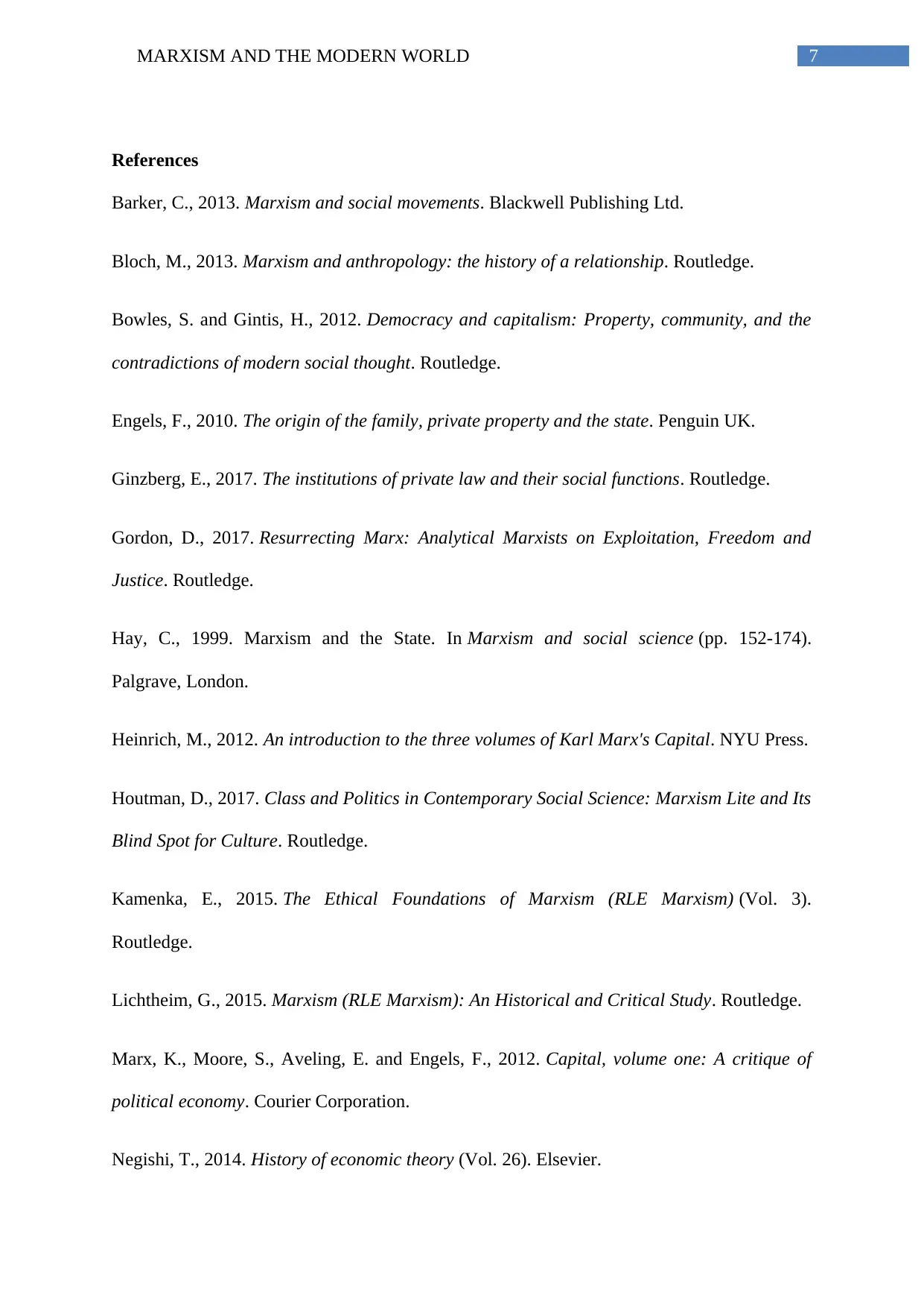
7MARXISM AND THE MODERN WORLD
References
Barker, C., 2013. Marxism and social movements. Blackwell Publishing Ltd.
Bloch, M., 2013. Marxism and anthropology: the history of a relationship. Routledge.
Bowles, S. and Gintis, H., 2012. Democracy and capitalism: Property, community, and the
contradictions of modern social thought. Routledge.
Engels, F., 2010. The origin of the family, private property and the state. Penguin UK.
Ginzberg, E., 2017. The institutions of private law and their social functions. Routledge.
Gordon, D., 2017. Resurrecting Marx: Analytical Marxists on Exploitation, Freedom and
Justice. Routledge.
Hay, C., 1999. Marxism and the State. In Marxism and social science (pp. 152-174).
Palgrave, London.
Heinrich, M., 2012. An introduction to the three volumes of Karl Marx's Capital. NYU Press.
Houtman, D., 2017. Class and Politics in Contemporary Social Science: Marxism Lite and Its
Blind Spot for Culture. Routledge.
Kamenka, E., 2015. The Ethical Foundations of Marxism (RLE Marxism) (Vol. 3).
Routledge.
Lichtheim, G., 2015. Marxism (RLE Marxism): An Historical and Critical Study. Routledge.
Marx, K., Moore, S., Aveling, E. and Engels, F., 2012. Capital, volume one: A critique of
political economy. Courier Corporation.
Negishi, T., 2014. History of economic theory (Vol. 26). Elsevier.
References
Barker, C., 2013. Marxism and social movements. Blackwell Publishing Ltd.
Bloch, M., 2013. Marxism and anthropology: the history of a relationship. Routledge.
Bowles, S. and Gintis, H., 2012. Democracy and capitalism: Property, community, and the
contradictions of modern social thought. Routledge.
Engels, F., 2010. The origin of the family, private property and the state. Penguin UK.
Ginzberg, E., 2017. The institutions of private law and their social functions. Routledge.
Gordon, D., 2017. Resurrecting Marx: Analytical Marxists on Exploitation, Freedom and
Justice. Routledge.
Hay, C., 1999. Marxism and the State. In Marxism and social science (pp. 152-174).
Palgrave, London.
Heinrich, M., 2012. An introduction to the three volumes of Karl Marx's Capital. NYU Press.
Houtman, D., 2017. Class and Politics in Contemporary Social Science: Marxism Lite and Its
Blind Spot for Culture. Routledge.
Kamenka, E., 2015. The Ethical Foundations of Marxism (RLE Marxism) (Vol. 3).
Routledge.
Lichtheim, G., 2015. Marxism (RLE Marxism): An Historical and Critical Study. Routledge.
Marx, K., Moore, S., Aveling, E. and Engels, F., 2012. Capital, volume one: A critique of
political economy. Courier Corporation.
Negishi, T., 2014. History of economic theory (Vol. 26). Elsevier.
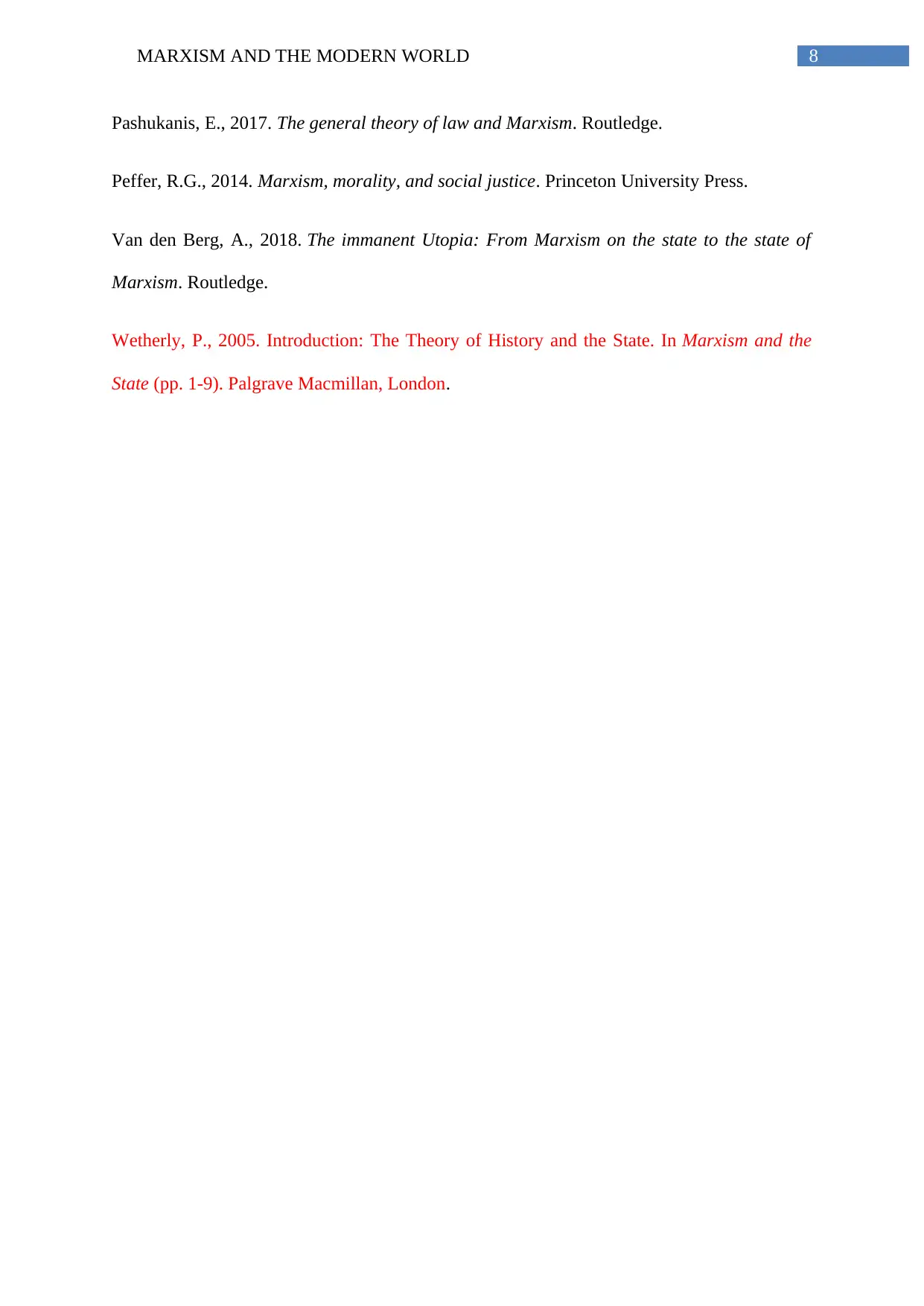
8MARXISM AND THE MODERN WORLD
Pashukanis, E., 2017. The general theory of law and Marxism. Routledge.
Peffer, R.G., 2014. Marxism, morality, and social justice. Princeton University Press.
Van den Berg, A., 2018. The immanent Utopia: From Marxism on the state to the state of
Marxism. Routledge.
Wetherly, P., 2005. Introduction: The Theory of History and the State. In Marxism and the
State (pp. 1-9). Palgrave Macmillan, London.
Pashukanis, E., 2017. The general theory of law and Marxism. Routledge.
Peffer, R.G., 2014. Marxism, morality, and social justice. Princeton University Press.
Van den Berg, A., 2018. The immanent Utopia: From Marxism on the state to the state of
Marxism. Routledge.
Wetherly, P., 2005. Introduction: The Theory of History and the State. In Marxism and the
State (pp. 1-9). Palgrave Macmillan, London.
⊘ This is a preview!⊘
Do you want full access?
Subscribe today to unlock all pages.

Trusted by 1+ million students worldwide
1 out of 9
Related Documents
Your All-in-One AI-Powered Toolkit for Academic Success.
+13062052269
info@desklib.com
Available 24*7 on WhatsApp / Email
![[object Object]](/_next/static/media/star-bottom.7253800d.svg)
Unlock your academic potential
Copyright © 2020–2026 A2Z Services. All Rights Reserved. Developed and managed by ZUCOL.




